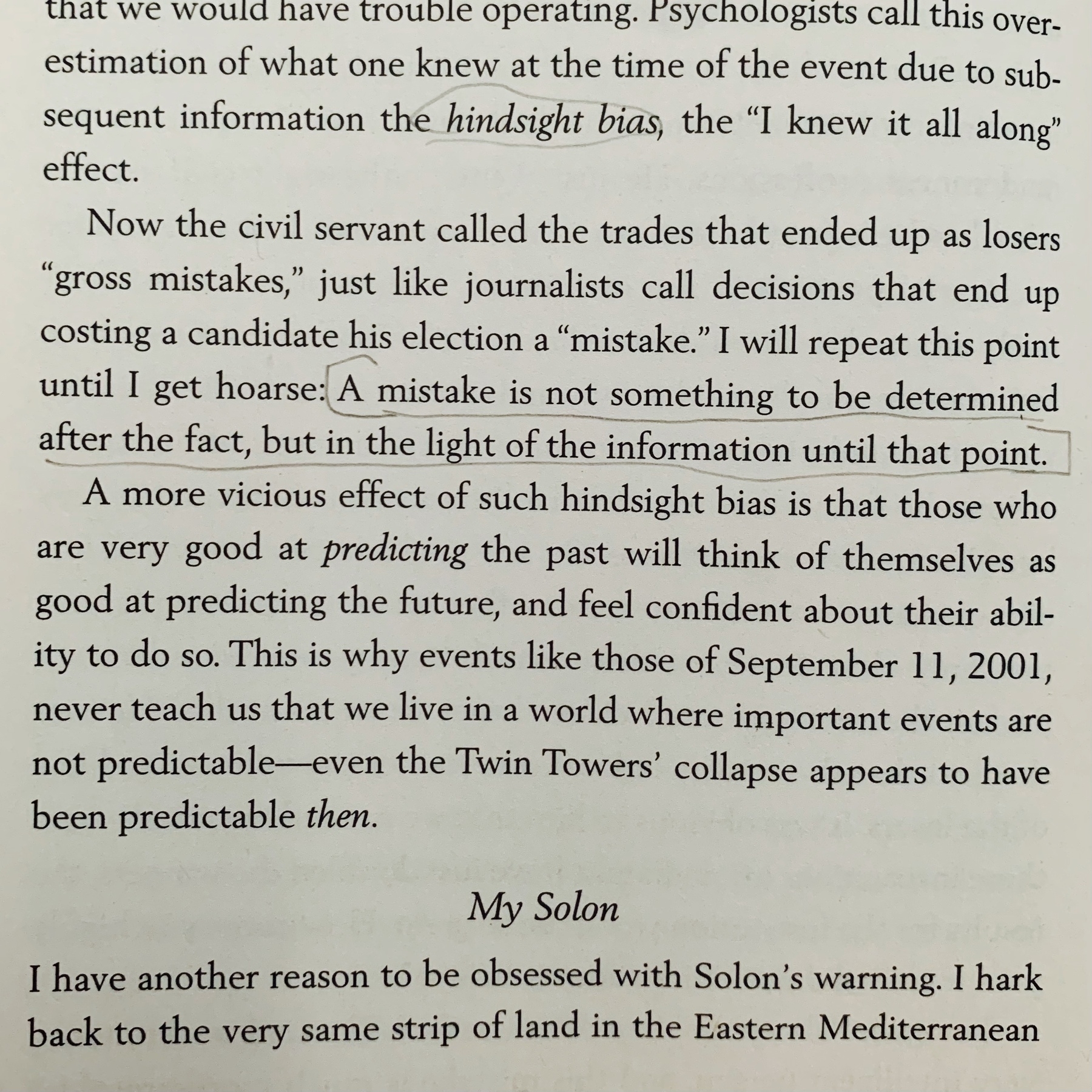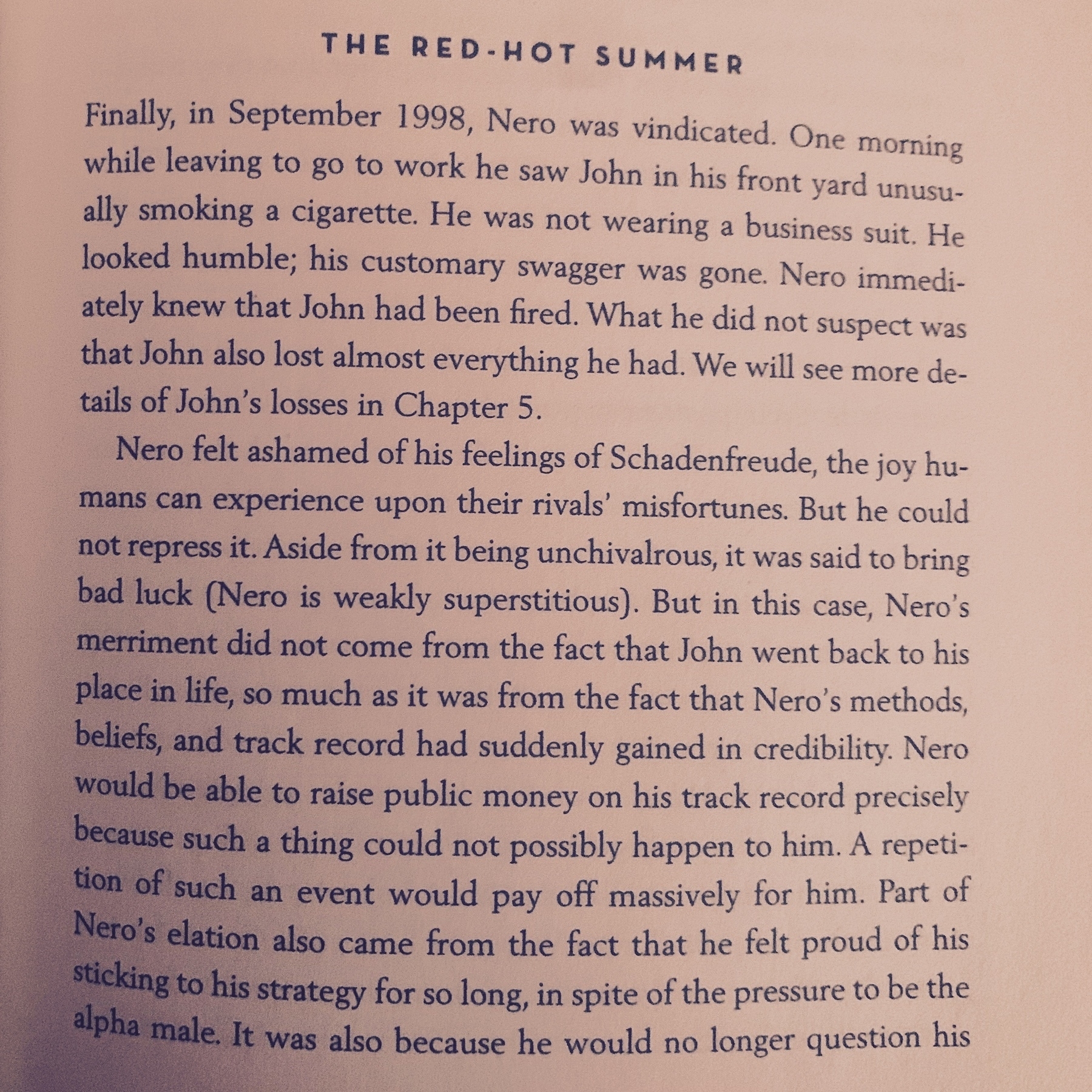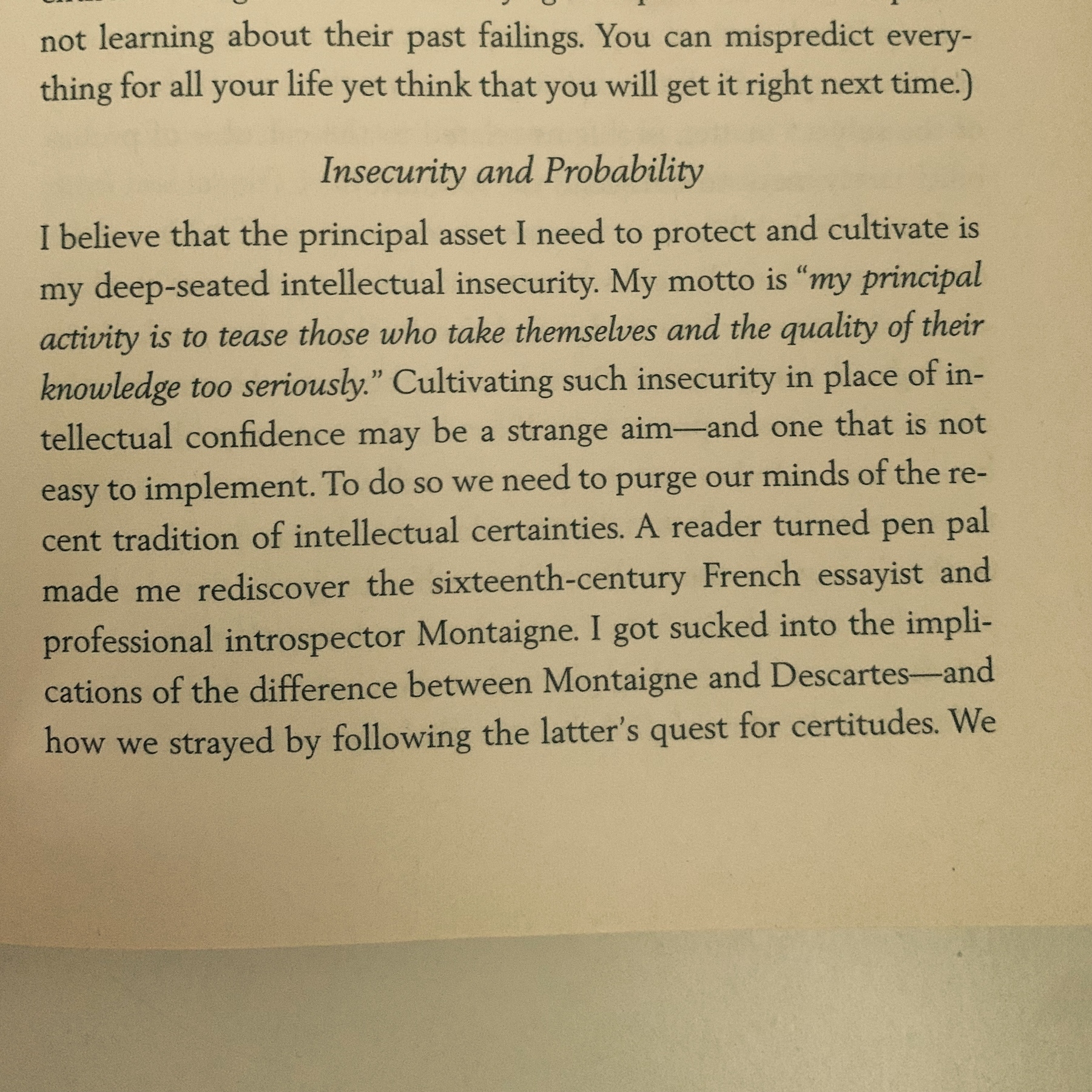📚 Fooled by hindsight bias. This one is for anyone who thinks lockdowns and school closures in the spring of 2020 were a mistake.
Making ex post “predictions” is infinitely easier than ex ante, and gives you a false sense of confidence to boot. Dangerous and stupid.

📚 Taleb the prophet, writing about cryptobros and the summer of 2022 back in the early 2000s.
Financial instruments come and go but human stupidity and greed are forever.

📚 Re-reading Taleb’s Fooled by Randomness for the first time since covid hit. From the preface, on intellectual immodesty. There is a direct line from this to the catastrophic early response to the pandemic.
BTW, our company is called Cartesian but we are Montaignes at heart.

📚 Calculated Risks was funnier than you’d expect from a book about statistical (in)numeracy. It’s healthy to laugh in the face of our inadequacies.
Calculated Risks
To get yourself in the right frame of mind before reading this book, try watching a few optical illusion videos. There is no reason to think our visual cortex is any dumber than the rest of the brain — in fact, quite the opposite. That our inference can be so easily fooled in a domain which is supposedly our strong suit is humbling.
Our statistical inference is even worse, so a short book or two on statistical numeracy should be in everyone’s library. Gerd Gigerenzer’s Calculated Risks can be that book for most people. The assumption, easily defensible, is that “most people” will get more use out of understanding frequentist rather than Bayesian probability. After all, most probabilities people are bombarded with — your chance of dying from breast cancer with and without screening, the chance of your neighbor being the killer given a positive DNA match (you know, the day-to-day stuff) — is frequentist.1
The only reservation to wholeheartedly recommending Calculated Risks to everyone is that it falls into the category of “blog post books”, if you believe that most non-fiction books should, in fact, have been just blog posts. Or, since blogs are out of vogue, a 15-minute YouTube video may do. Or perhaps a single sentence: use natural instead of relative frequencies (e.g. 1 in 10.000 instead of 0.01%). Let your faulty cortex fill in the rest.
-
It’s Bayesian companion could be The Scout Mindset. ↩︎
📚 Bullshit Jobs ended up being copy pasta of David Graeber’s fan mail. Too bad, as the premise is as relevant as ever.
Bullshit Jobs
A massively biased and, ultimately, underwhelming account of jobs that even people performing them think shouldn’t exist. It is biased because David Graeber’s sole source of information — beside his own flowering mind — were his Twitter followers. More precisely: his followers' self-imolations in prose sparked by the short essay which popularized the term. So you get not only a self-selected sample of young middle-class professionals discontent with their jobs, but also the attempts of that sample to connect with their anarchist idol. A fun game to play while plodding through these accounts — accounts which, by the way, take a full half of the book — is to spot the embelishments. There are many, and some even Graeber marks as such.
As for underwhelming, well, the book’s purely descriptive nature wouldn’t be so bad if it weren’t skin-deep. Graeber comes frustratingly close to asking some interesting questions; In no particular order: Should we be worried about AI taking our livelihoods if most jobs are irrelevant anyway? How much of what doctors do is bullshit, and are they aware of it? Is the private sector just as bad as the government in real-to-bullshit job ratio, or are some companies better than others, and is that reflected in their market value? Are there any signs of de-bullshitization in countries that experimented with Universal Basic Income? alas, that would have required too much research. Instead we got fan mail copypasta and cheap digs at the corporate culture. So it goes…
📚 Cal Newport has some good ideas.
A World Without Email
Cal Newport’s new book goes well with David Graber’s Bullshit Jobs (about which more to come). Newport may have in fact provide a good, if partial, answer to one of Graber’s main questions — why have jobs that workers themselves see as useless proliferated in the last 50 years? No, it isn’t just email, but rather this: supporting structures of large institutions (think IT, HR, accounting, etc) have taken a life of their own and behave as if their own performance metrics — rather than the instituion’s primary reason for being — are all that matters. Enter thousands of survey requests, daily updates, weekly newsletters, calls for feedback… from dozens of departments all shouting about their contribution to the “core mission”.
So one way to get out of email hell is to work at a smaller place, having anyone completely dedicated to human resources being a good surrogate for being too large. But even that won’t completely save you: as long as you work in a team there will be need for internal communication, and as long as the primary mode of that communication is via email, the hyperactive hivemind — Newport’s preferred phrase — will ensue. Much of the book talks about how this came to be, and how to avoid it. While none of it is revolutionary (some of it even covered on this very blog, twice!), it did point me to Asana, Trello, and other collaborative task/project management apps with file storage and messaging capabilities as good alternatives that I tended to disregard.
As for external communication, well, if the email is longer than five sentences, better make it into a call, preferably the old-fashioned kind.
A World Without Email could easily have fit into the blog post in book form category but for the need to persuade key people that too much email is in fact a bad thing, said people being ones with power to save their employees from email hell yet not being aware that their employees need saving, as they themselves tend to be protected form the onslaught with layers and layers of administrative assistants. On-demand administrative assistants for the regular schmoes being another one of Newport’s proposed solutions. I remain sceptical. Judging from the reception in the types of newspapers “key people” tend to read, he has their attention.
📚 Social networks aren’t the problem, ignorance is. Carl Sagan called it 30 years ago. So if you are annoyed by Twitter’s overall tone maybe schools are more to blame than we admit, on all sides and at all levels of education?